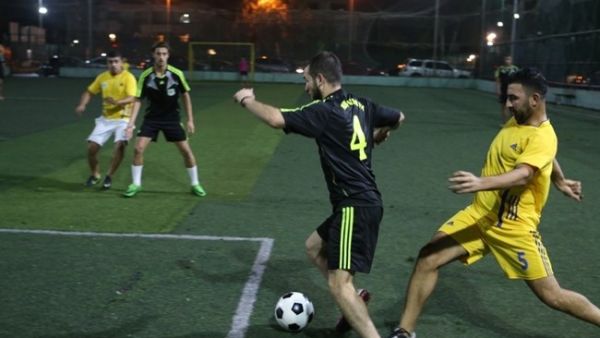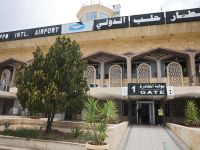Yehya Sarris sat on a bench on the sidelines of a football field, watching the players of all ages training for League of the Camps – a tournament between Beirut’s Palestinian football teams that kicked off Sunday. Sarris’s quick smile and shining eyes expressed his pride at playing in the league organized by Majd al-Krom better than words. Sarris’s team is one of the clubs from the Shatila Palestinian refugee camp.
Sarris was born in the camp and came up with the idea for the football team in 2001, a year after he founded the charity organization Majd al-Krom with five fellow Palestinians. Initially conceived as a support network for those living in the camp who were originally from the Galilee village of the same name, the organization soon started serving all, regardless of religion, political stance or nationality.
“Times were tough and sports could help us take the children and the young ones off the streets [where there is] violence and drugs,” Sarris told The Daily Star. He said that access to sports would also give kids something to look forward to, given the pervasive lack of opportunities for many Palestinians in Lebanon.
“We don’t have safe spaces for children here,” Ferial Kiwan, Shatila resident and a camp services officer for the U.N.’s Palestinian refugee agency UNRWA, said. In the camp, “the lack of accountability and the rule of the jungle” prevail, he said, and prostitution, as well as drug and weapons dealing, are frequent.
Shatila’s dark, damp and overcrowded alleys, with its haphazard electrical wiring and dangling water pipes, weren’t appropriate to play football. So Majd al-Krom had to hire stadiums to train and play, or make use of the public amenities such as those near Horsh Beirut.
Sarris and his friends then started to talk to the other football teams from Beirut’s refugee camps like Mar Elias and Burj al-Barajneh. In 2004, six teams came together to create the League of the Camps.
The league now features 14 teams and is presided over by Sarris. In his Shatila office, where he receives a daily trickle of people seeking help and advice, trophies from different seasons are stacked up.
Midfielder Oudai Hilal, 29, who’s been playing for Majd al-Krom for 11 years, told The Daily Star of the deep gratitude he feels toward Sarris.
“Football means life to me,” Hilal said. “[It’s] an irresistible passion and my way to discharge troubles and negative thoughts. This is my time, where I can find myself. No one can harm me here.”
When Hilal was a kid, he used to dream about becoming a professional footballer. He said he didn’t lack the talent but, unfortunately, lacked the means. At age 16, he had to leave the Lebanese team he played for and his dreams were cut short.
Now the fan of Barcelona megastar Lionel Messi and U.K. premiership club Arsenal no longer hopes for a footballing future, instead wanting his own family, to take advantage of any opportunities he’s given and ultimately to get out of Lebanon – like one of his siblings who he said made it to Germany after a tough trip through Turkey and Greece.
“There are more opportunities these days, since academies and coaches are out there talent scouting,” Hilal said. “But without help, these kids won’t be able to make it.”
As he spoke, he gestured toward young promising Shatila brothers, 13-year-old Mohannad and 12-year-old Mohammad, who train in a Lebanese football academy thanks to the support of Majd al-Krom.
“The league is not only for entertainment but a place where we Palestinians gather together. It helps us preserve our identity,” Hilal said.
The players also feel lucky to have 40-year-old coach Mustafa Tuska, who played with some of the biggest teams in Lebanon, including Ansar football club. He told The Daily Star he was happy to see the team’s progress, adding that his role is a “big responsibility.”
While most of the players have been boys, Sarris expressed optimism that more girls were showing an interest. Despite the conservative outlook of some of the community – “especially now that the population is more mixed in terms of nationalities” – he said he hoped to create a women’s football club in the near future.
In the meantime, Sarris – despite holding a European passport – expressed no desire to leave the country or even Shatila, and said he will continue to work on Majd al-Krom’s many projects to provide help to the underprivileged.








